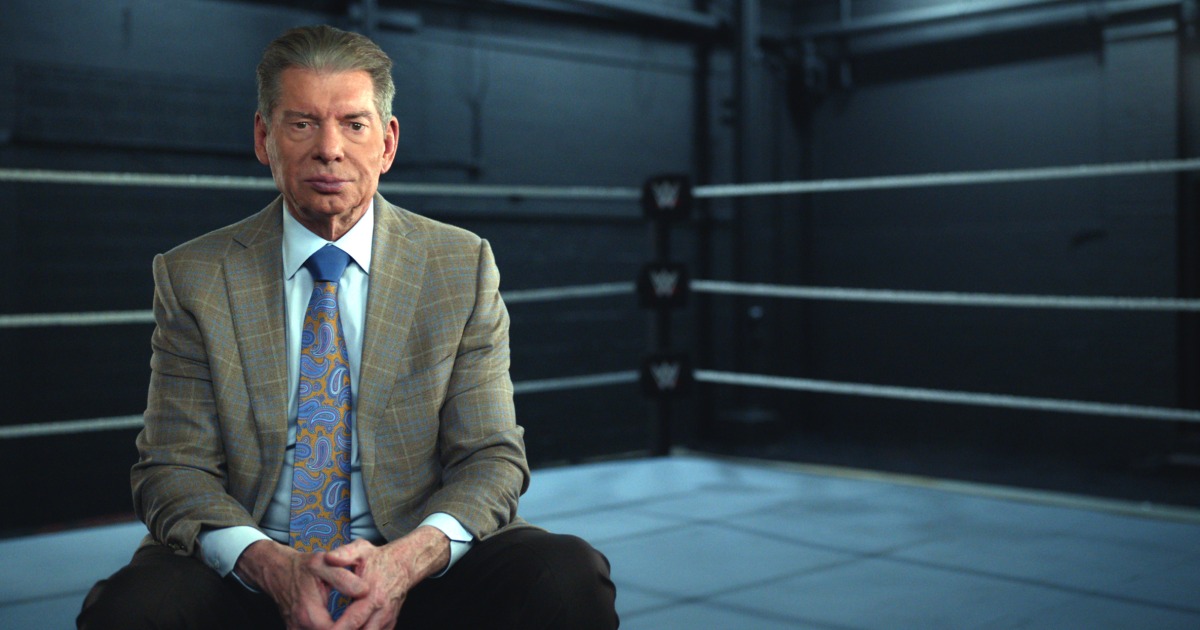As a federal criminal investigation hangs over former World Wrestling Entertainment CEO Vince McMahon, a new documentary series on Netflix offers a rare look at the man credited with turning professional wrestling into a cultural juggernaut.
McMahon sat for hours of interviews before abandoning the project amid sexual misconduct allegations.
The series only briefly touches on the lawsuit filed against McMahon in January by former WWE employee Janel Grant, who accused him of sexual abuse and trafficking. McMahon has denied any wrongdoing, and the lawsuit is on hold pending the federal investigation.
When he does address the scandals and controversies that have dogged him for decades, he expresses little remorse.
He brushes off an allegation levied by former referee Rita Chatterton that he raped her in 1986. “Once you’re accused of rape, you’re a rapist. But it was consensual,” he says in the series. “And actually, had it been a rape, the statute of limitations had run out. So it’s all kind of crap like that that people are digging up and trying to find on you.”
McMahon blames New York Post columnist Phil Mushnick, a frequent critic of WWE, for his 1993 federal indictment on allegations of steroid distribution. (He was acquitted.)
He stands by his decision to continue a pay-per-view event 25 years ago after wrestler Owen Hart died in a stunt gone wrong — as other wrestlers body slammed one another in a ring still stained by Hart’s blood. “Had it been me who was splattered on the mat,” McMahon elaborates, “I’d want the show to go on.”
And McMahon dismisses the explanation that wrestler Chris Benoit suffered from chronic concussions that could have led him to kill his family and then himself in 2007, but after that, he says, he stopped the wrestlers from hitting one another with steel chairs in shows.
In the docuseries, McMahon speaks in a subdued manner — almost a gravelly whisper, compared with the growling roar he was known for on a microphone in the ring.
Though he delves into his career, McMahon seems reluctant to explore his childhood at length, other than to suggest it was abusive.
“I’m not big at looking backwards at all,” McMahon says in the series. “I’m not sure whether or not I’m afraid to look back.”
Many of the interviews in the six-episode series, which Netflix will release Wednesday, were recorded two years ago — before McMahon’s 2022 resignation as WWE CEO due to revelations he had paid $12 million to four women to secure nondisclosure agreements related to claims he engaged in sexual misconduct. The docuseries notes that McMahon canceled the remaining interviews after The Wall Street Journal broke the news about the misconduct allegations and payments. Grant, who filed the suit against McMahon this year, did not participate in the documentary, according to her attorney, Ann Callis.
McMahon said in a statement Monday that based on an early partial cut he watched, the docuseries “takes the predictable path of conflating the ‘Mr. McMahon’ character with my true self, Vince.” He accused the producers of using “typical editing tricks” to “support a deceptive narrative” and said he hoped viewers will “remember that there are two sides to every story.”
A question repeatedly asked during the series is how much difference there is between McMahon, the person, and “Mr. McMahon,” the on-screen character that was born during the late 1990s “Attitude Era” of WWE, which was known for pushing into R-rated territory. Several WWE stars in the series concede that the way women were treated in the Attitude Era would not be permitted today, and some, like Shawn Michaels, suggest that perhaps they should have toned it down back then.
But McMahon defends the decisions made at the time. In spite of storylines that involved rape, simulated deaths and women being forced to strip their clothes, he describes it in the series as “still family-friendly — maybe more for an adult family, just not young kids.” And he adds that those scenes with scantily clad women were ratings hits.
When McMahon himself appeared as part of the WWE storylines and scenes in that period, he was shown cheating on his wife and soliciting sexual favors from women.
When McMahon is asked in the fourth episode of the Netflix series what similarities he has with the Mr. McMahon character, he responds, “None whatsoever.” But in the sixth episode, he admits some overlap. “I’m wondering myself, now, which is the character and which is me,” he says. “I guess maybe it’s a blend, and I would suggest that one is exaggerated a little bit, but I’m not so sure which one.”


